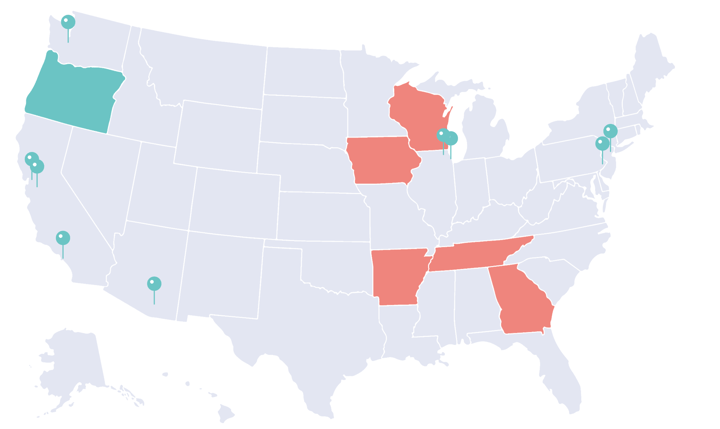
- Home
- Crunchtime Blog
- Predictive Scheduling Deep Dive: What Restaurant Operators Should Know

Predictive Scheduling Deep Dive: What Restaurant Operators Should Know
In A History and Overview of Fair Workweek Laws for Restaurants, we provided a brief history of Fair Workweek laws and their implications for restaurants in different jurisdictions. We also shared the most common Fair Workweek requirements that impact restaurants in The Restaurant Operator’s Guide to Fair Workweek in 2023. In this article, we’ll dive deeper into a type of Fair Workweek law known as predictive scheduling, and we'll discuss in more detail the associated penalty pay that restaurants can incur if the rules are not followed.
What are Predictive Scheduling Laws?
Predictive Scheduling Laws refer to legislation that is intended to give employees more predictable work schedules and enough notice to plan their lives outside of work. The laws require employers to provide employees with their work schedules by a minimum time period before the start of the shift or schedule, and the rules vary by jurisdiction. If a manager changes a schedule within the notice period, the employer may be required to pay the employee a premium as a penalty for failing to provide enough notice.
Most jurisdictions require employers to post their schedules two weeks before the first day the schedule starts, but some jurisdictions require that individual shifts are posted within two weeks of the beginning of the shift. This generally means that the employer must publish the entire schedule two weeks before the last day of the schedule, which is closer to 21 days in advance of that shift.
Three weeks is a substantial amount of time between the date the schedule is published and when the shift will actually be worked. If the manager gets the schedule wrong ad needs to make changes, the premiums can become quite expensive and difficult to track. While this can be challenging, restaurants are covered in scenarios like this with Crunchtime's Labor and Scheduling platform.
Predictive Scheduling in New York City
Using New York City as an example, the table below depicts the premiums a restaurant would incur for each schedule change based on the situation and the amount of notice provided. The restaurant would owe different amounts for changes made less than 14 days, less than a week, and less than one day from the start of the schedule.
Restaurant operators should remember that the closer you are to the start of the schedule, the more money is due to the employees. Premium structures like the example below are fully configurable in Crunchtime and all compliant scheduling platforms should enable restaurants to customize their labor rules to this level of granularity or more.
Premiums (Penalty Pay) for Schedule Changes in New York City |
|||
|
Amount of Notice |
Premium for |
Premium if no impact on total hours |
Premium for |
|
Less than 14 days’ notice |
$10 per change |
$10 per change |
$20 per change |
|
Less than 7 days’ notice |
$15 per change |
$15 per change |
$45 per change |
|
Less than 24 hours’ notice |
$15 per change |
$15 per change |
$75 per change |
The amount of money owed varies by jurisdiction so it is important that restaurant operators pay careful attention to the laws that apply to each store location. Some jurisdictions are far less complicated than New York City and instead of three thresholds to consider with schedule changes, they just have one threshold. You can learn more about the Fair Workweek laws that most commonly affect restaurant operators here.
What happens if you add hours to a schedule?
You can expect to incur a premium if you add additional hours to an employees schedule. This applies to both adding hours to an existing shift or creating a brand new shift.
What happens if you change the start time of a schedule?
If a manager realizes they need an employee to come in earlier or later, they can expect to pay a premium, even if the schedule change has no impact on the total hours of an employee's shift. For example, if a bartender's shift is scheduled from noon to 4:00 p.m, and the manager moves the shift to start one hour later (1:00 to 5:00 p.m), they will owe the employee premium pay. Even though the bartender is scheduled for the same amount of hours, they have made changes to the shift outside of the notice period which will come at a cost.
What happens if you reduce hours on a schedule?
Restaurants can expect to pay the biggest premiums if they reduce the hours of a shift. This includes reducing the shift by more than 30 minutes or completely removing the shift altogether. If this happens within 24 hours of the scheduled shift in New York City, the premium would be $75, as shown in the table above. In this scenario, the manager might as well have the employee come into work to avoid paying this high premium.
What about employee-initiated changes?
In most jurisdictions, if an employee decides to go home early on their own accord, they can do so without the employer incurring a premium if they agree to a waiver. However, if the employer sends an employee home early because it's slow day, they would have to pay the penalty.
While there are some exceptions such as public emergencies, a snowstorm, etc. that would exclude them from paying a premium, generally if an employee is scheduled, they should work their scheduled shift. If they do not work their scheduled shift, it would fall into the bottom threshold for less than 24 hours’ notice because they are essentially changing their schedule at the last moment.
What happens when an employee initiates a change, like swapping a shift?
In most jurisdictions, except for New York City, an employee-initiated change like a shift swap will not result in a premium. Crunchtime makes this easy by allowing the manager to post an open shifts, and employees can pick the shift up in the Teamworx app by choice.
New York has a slightly different stance on open shifts, because they consider this to be an employer-initiated change — the employer is asking an employee to do something, and then someone is committing to the new schedule. In other jurisdictions, if someone wants to pick up a new shift at the last minute, it is excluded from the rule. But in New York, the employee will essentially get a bonus for picking up a last minute shift.
How can restaurants maintain compliance?
For large restaurant brands or franchisors with store locations across different cities and states, it can get very complicated to manage the different configurations of labor laws. The value of an restaurant scheduling solution that manages compliance will quickly become apparent for these multi-unit operators.
With a scheduling tool like Crunchtime, employers can customize how all of these variables are handled. This includes configurations around these variables and more:
- Based on shift or schedule start
- Employee waiver allowed or disallowed
- Premium based on hourly rate or flat fee, including multipliers
- Number of days’ notice
- Premium fees dependent on hours lost or no hours lost
- Minimum change minutes for each type
Once the labor rules are set up by the system administrator in Crunchtime, the next step is creating and publishing the schedule. Crunchtime provides a variety of alerts that keep managers constantly informed about compliance requirements during the scheduling process.
For example, if a restaurant manager in California is required to post the schedule 14 days in advance, the system automatically alerts them when they have 2 days left to post the schedule.
If the manager tries to make a change to the schedule that violates a labor rule, the system will let them know. These alerts help managers avoid incurring any accidental premiums.
If a manager realizes they are going to be short staffed for the big game on Sunday and they really need another shift covered, they may decide to make a change to the schedule and accept the penalty pay. Crunchtime will show the manager exactly what amount of additional pay will be incurred so they won't be surprised with their labor costs at the end of the week.
Compliance is complicated. So what can restaurants do?
With all of this added complexity, it’s tempting to say that Fair Workweek isn’t fair to restaurant operators. But complying with these rules can have a beneficial impact on employees' work-life balance, helping to reduce burnout and staff turnover in the long run. By making schedules more stable and transparent, employers have an opportunity to boost employee satisfaction and improve retention.
The key to addressing these challenges is using a reliable technology partner who stays on top of the ever-changing landscape of labor laws. By choosing a scheduling solution that is flexible enough to accommodate the tricky nuances of these rules, restaurants can rest assured that they are prepared and compliant in every jurisdiction. With a scheduling system that can not only handle the requirements, but also alert managers to violations before they happen, restaurants can be proactive and positioned for sustainable growth.
Ready to learn more?
Labor law compliance is critical to the success of growing restaurant brands. To learn more about Fair Workweek compliance and other features in Crunchtime Labor & Scheduling, request a demo today.
Share this post
Related


How to Be Labor Law Compliant Using Predictive Technology

